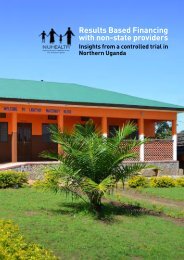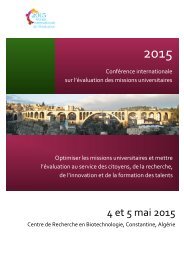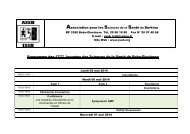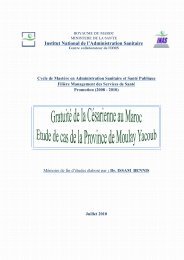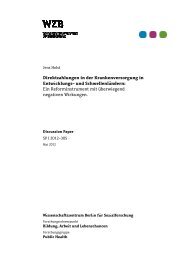• A critical analysis of the history ofevaluation and evaluation outcomes ofpast related projects in a given context• A critique of past and related projectsfrom the communities’ perspective• Development of community-ownedstandards for evaluation of project, andintegration with project blueprintstandards - integration of indigenousand imported evaluation standards.• A combination of communityindigenous methods and adaptedWestern methods, in order to collectevidence of merit and worth• Dissemination of evaluation outcomesapproaches that are inclusive ofcommunity indigenous disseminationapproaches.Relational evaluationA relational evaluation approach is drawn fromthe everyday greeting practices of the majorityof African communities and from the SouthernAfrican axiom nthu nthu ne banwe, meaning “Iam because of we are.” In most Africancommunities, evaluation of wellness of oneanother is an on-going process that marks aclear difference between Western and African.A typical greeting involves people asking eachother about their wellness, the wellness of theirchildren and those related to them, includingnon-living things. Among villagers, during theplanting season, the greeting might extend toasking about crops and, during the harvestseason, asking about the crop yield. Relationalevaluation valorises evaluation approaches,even one that is evident in the everydayevaluation of wellness that comes out throughthe way people greet each other.The African extends the relationship of peoplenot only to human beings but also to non-livingthings. The Southern African metaphor ontotems illustrates this connection of humanbeings to non-living things and reminds us thatevaluation of projects from the Africanperspective should include a holistic approachthat links the project to the sustainability of theenvironment. The Bakalanga of Botswana areconnected to each through the sharing oftotems. These totems are symbolicallyrepresented through non-living things, forexample, a heart or living things, for example,animals such as elephants and lions. Men andwomen are addressed using their totems as asign of respect for their identity. My totem is, forinstance, a crocodile and that of my mother is achibelo (a bird). I have an obligation to respecta crocodile and chibelo, never at anytimeparticipating in killing anyone of these twoliving things (Chilisa 2005, Chilisa 2012).People sharing the same totem have values thatthey share that are celebrated through rituals.Evaluation of development programmes inAfrica is about the contribution of projects tothe quality and wellbeing of the people. But inaddition, with the everyday practice of Africans,the wellbeing of relatives and those around,including things, is as important as one’s wellbeing. Thus Africans will usually say they are“not that well” if a relative is not well.According to Carden and Alkin (2012), “there ismuch that can be done to strengthen theevaluation practice in LMIC through definitionand articulation of work that is doneinformally.” We believe that the everyday thingsthat demonstrate how people make valuejudgment are as important in buildingframeworks for evaluation practice as whatevaluators do in the field.A relational evaluation includes the followingcritical elements.1. Critical analysis of the history ofevaluation and evaluation outcomes ofpast related projects in a given context2. Critique of past and related projectsfrom the communities perspective3. Description of community involvementin the development of project goals4. Community development of holisticstandards that incorporatesenvironment elements that connectpeople with the project and integrationwith project standards as articulated bydonors.5. Presentation of the ubuntu, whichemphasises the role of belongingness,togetherness, interdependence,relationships, collectiveness, love andharmony to build communityrelationships. For example, ageAfrican Thought Leaders Forum on Evaluation and Development, <strong>Bellagio</strong>, Nov 2012 35
egiments in Botswana provided a wayof grouping people and monitoring andevaluating their progression and qualityof life. The regiments were given agroup name and members becameresponsible for one another and forupholding the values communicated tothem during the traditional interventionthat introduced them to adult life.6. Presentation of established, formalisedcommunity and stakeholdersrelationships.7. Holistic construction of evaluationknowledge to produce evidence,through:a. Listening to metaphors on theenvironment that have arelationship to the projectb. Valuing community knowledgeand using it as a basis forfurther improvement andsustainability of projects.8. Explanation of both community-setstandards and stakeholders’ standardsto evaluate worth and merit.9. List and explanation of core valuesbased on an I/we relationshipa. Value validityb. Fairnessc. Reflexivity based on an I/werelationshipd. Community as knowers andcommunity as evaluatorse. Evaluators and funding agentsestablishing long lastingrelationships withcommunities.The Ideal African CommunityDevelopment Evaluation FrameworkThe two branches of the African tree model –decolonisation and indigenisation, andrelational – illustrate the deconstruction thatcurrent evaluation theory and practice need togo through before arriving at truly Africanrootedand African - driven theory and practice.The complementary model of the ideal Africancommunity begins to describe what such apractice would look like. An African lives inand for the community. The individual cannotexist without the community and thecommunity cannot exist without the individual.The conscious interdependence between theindividual and the community is whatcharacterizes that which is essentially African.This model is built on the concept of ubuntu(described earlier), which, in simple terms,means community, and the essence of beinghuman. The ideal African communitydevelopment/evaluation model can bedescribed by five interrelated andcomplementary ubuntu principles.• Sharing and collective ownership ofopportunities, responsibilities andchallenges – Ants united can carry a deadelephant to their cave; a rooster maybelong to one household but when itcrows, it crows for the whole community; alit candle loses nothing by lighting anothercandle.• The importance of people and relationshipsover things – It is better to be surroundedby people than by things.• Participatory decision making andleadership – Taking action based on oneperson’s views is like provoking wasps in anest; no matter how blunt, a macheteshould never be held by a mad person.• Loyalty – The river that forgets its sourcewill soon dry up.• Reconciliation as the goal for conflictmanagement and resolution – Those wholive in peace work for it.!The five principles describe the idealcommunity and they result in concrete material,social and spiritual benefits. African societiesused these as basis for their assessments ofcommunity/societal progress.African Thought Leaders Forum on Evaluation and Development, <strong>Bellagio</strong>, Nov 2012 36



